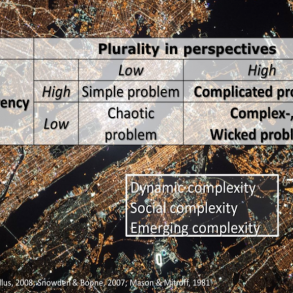By Evgenya Nee for Enlivening Edge Magazine
“When you can make opposites into complements then you move forward.” ~Norman Wolfe
At the First-Thursday EE Community Conversation in September Norman Wolfe was our inspiring storyteller about how he came to understand Why Profit is Important – The Grounding of the Consciousness Movement. The conversation was resonant and thought-provoking for me. Norman’s points on profit and leadership are sometimes “far out” from others in the conscious business community. Nonetheless, his 2011 ground-breaking book The Living Organization has become widely recognized.
Norman started his work life in 1969. In one of his first jobs he was told to leave his personal life behind when at work, and that “we are not supposed to love what we do, as we are not coming to work to play”. I am sure all of us have heard such statements at least once.
Five decades later, too many of us still live in the same paradigm where it is customary and a societal norm to have two walled-off personas separating work life from personal life. I have done that myself, following the societal norm. However, I realized that this kind of segregation of self was taking too much energy from me since at every moment I could not escape from being me… the whole me.
If the old paradigm worked and organizations were able to achieve the goals they set out, we could perhaps conveniently ignore/overlook how people feel about their work. That isn’t the case, however. Norman shared that ”For a few decades now, we have been stuck at a 70% failure rate of being able to execute strategies.”
He emphasized that we are stuck between two sides: achieving business results and the desire for creative employees.
The moment we start focusing on results we slide into business-as-usual context. This unfortunately means we start putting people in boxes, assigning roles/responsibilities, and then assigning an overseer to make sure the job gets done.
Most of us know that the current work paradigm is outdated and dysfunctional. How do we evolve from old to new? How do we bridge the gap without, as Norman said, “throwing the baby out with the bathwater”? How do we form a bridge to the new from the current context and belief systems held subconsciously, the hidden assumptions that underpin our behaviour and current paradigm?
Norman is Chairman and CEO of Quantum Leaders, a leading edge consulting company guiding boards and CEOs to improve strategy execution. In his book The Living Organization he presents a thesis developed through 40 years’ experience, that an organization is a living organism and moreover it has a persona like a living being. Hence principles of psychology can be applied to the collective to help the collective achieve business outcomes. So we see that an organization’s underlying belief systems or context really impact everything it does and what outcomes are possible.
Norman emphasized that from the business leaders’ perspective, bottom line results are what they are accountable for first and foremost. However, bottom line results, in Norman’s definition, are not limited to maximizing profits for shareholders. Results are broader—as in creating outcomes necessary for an organization’s success.
How can we bring the new paradigm by honouring and attending to an organization’s success and helping it achieve bottom-line results?
We also discussed whether trying to solve the problem only structurally such as with sociocracy or Holacracy® makes sense? There is a high failure rate when applying structures and the reason is that we have not prepared the people to operate in the new structure. Norman mentioned that the assumption that the structure will force people to behave accordingly is about 30% accurate—hence we are seeing 70% failure rate. A company could take a risk even with these odds but then it should be prepared to take that level of fallout; most companies cannot afford to do that.
The discussion after Norman shared his journey through his career was quite invigorating. Here are some memorable points contributed by participants. I hope they will give you some food for thought:
“Profit is as necessary as breathing for the business to be sustainable and the organization to flourish. However, what resonates is purpose beyond profit.”
“Can we get over the addiction to leadership? Should there be power and control over others or can we generate value as contributors not controllers or projectors?”
“It’s not an either-or game. It seems that the conscious business community swung the pendulum too far left in trying to make profit a bad thing. As a result, it’s losing its ability to gain traction because we are not honouring what’s important to the people we want to impress.”
“This is an issue with the business conscious community: it is highly judgmental of the old models. There is no compassion for the people we are trying to shift. But all we are doing is facilitating the opposition. When you can make opposites into complements then you move forward.”
Conversations like this among those of us in the conscious business community are valuable because airing differences in views results in deeper and at times profound insights. The result depends, of course, on all sides having patience and space to engage in an open, constructive, and productive dialogue. The atmosphere in Enlivening Edge’s Community Conversations provides such spaciousness and openness.

Evgenya Nee, Strategic advisor | Change catalyst | Fortune 100 I have over 20 years of experience consulting with Fortune 100 companies as well as large and medium sized privately-owned businesses. As I have been advising clients across different companies, industries and geographies, I kept coming across similar challenges. The most important part of any organization are its people and this simple fact unfortunately gets commonly overlooked. Hence, I founded Synergeine, a company dedicated to applying human-centric approaches to unlock and harness individual and team potential to maximize engagement and organizational performance.




